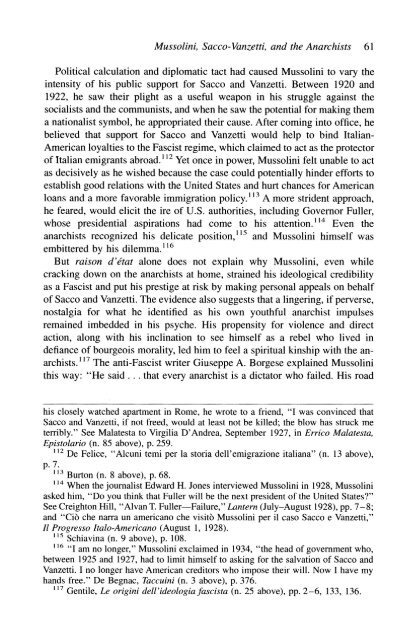Mussolini, Sacco-Vanzetti and the Anarchists
Mussolini, Sacco-Vanzetti and the Anarchists
Mussolini, Sacco-Vanzetti and the Anarchists
You also want an ePaper? Increase the reach of your titles
YUMPU automatically turns print PDFs into web optimized ePapers that Google loves.
<strong>Mussolini</strong>, <strong>Sacco</strong>-<strong>Vanzetti</strong>, <strong>and</strong> <strong>the</strong> <strong>Anarchists</strong> 61Political calculation <strong>and</strong> diplomatic tact had caused <strong>Mussolini</strong> to vary <strong>the</strong>intensity of his public support for <strong>Sacco</strong> <strong>and</strong> <strong>Vanzetti</strong>. Between 1920 <strong>and</strong>1922, he saw <strong>the</strong>ir plight as a useful weapon in his struggle against <strong>the</strong>socialists <strong>and</strong> <strong>the</strong> communists, <strong>and</strong> when he saw <strong>the</strong> potential for making <strong>the</strong>ma nationalist symbol, he appropriated <strong>the</strong>ir cause. After coming into office, hebelieved that support for <strong>Sacco</strong> <strong>and</strong> <strong>Vanzetti</strong> would help to bind Italian-American loyalties to <strong>the</strong> Fascist regime, which claimed to act as <strong>the</strong> protectorof Italian emigrants abroad.' 12 Yet once in power, <strong>Mussolini</strong> felt unable to actas decisively as he wished because <strong>the</strong> case could potentially hinder efforts toestablish good relations with <strong>the</strong> United States <strong>and</strong> hurt chances for Americanloans <strong>and</strong> a more favorable immigration policy. 13 A more strident approach,he feared, would elicit <strong>the</strong> ire of U.S. authorities, including Governor Fuller,whose presidential aspirations had come to his attention." 14 Even <strong>the</strong>anarchists recognized his delicate position,"15 <strong>and</strong> <strong>Mussolini</strong> himself wasembittered by his dilemma."16But raison d'etat alone does not explain why <strong>Mussolini</strong>, even whilecracking down on <strong>the</strong> anarchists at home, strained his ideological credibilityas a Fascist <strong>and</strong> put his prestige at risk by making personal appeals on behalfof <strong>Sacco</strong> <strong>and</strong> <strong>Vanzetti</strong>. The evidence also suggests that a lingering, if perverse,nostalgia for what he identified as his own youthful anarchist impulsesremained imbedded in his psyche. His propensity for violence <strong>and</strong> directaction, along with his inclination to see himself as a rebel who lived indefiance of bourgeois morality, led him to feel a spiritual kinship with <strong>the</strong> anarchists.l17The anti-Fascist writer Giuseppe A. Borgese explained <strong>Mussolini</strong>this way: "He said. . . that every anarchist is a dictator who failed. His roadhis closely watched apartment in Rome, he wrote to a friend, "I was convinced that<strong>Sacco</strong> <strong>and</strong> <strong>Vanzetti</strong>, if not freed, would at least not be killed; <strong>the</strong> blow has struck meterribly." See Malatesta to Virgilia D'Andrea, September 1927, in Errico Malatesta,Epistolario (n. 85 above), p. 259.112 De Felice, "Alcuni temi per la storia dell'emigrazione italiana" (n. 13 above),p.7.113 Burton (n. 8 above), p. 68."14 When <strong>the</strong> journalist Edward H. Jones interviewed <strong>Mussolini</strong> in 1928, <strong>Mussolini</strong>asked him, "Do you think that Fuller will be <strong>the</strong> next president of <strong>the</strong> United States?"See Creighton Hill, "Alvan T. Fuller-Failure," Lantern (July-August 1928), pp. 7-8;<strong>and</strong> "Cio che narra un americano che visit6 <strong>Mussolini</strong> per il caso <strong>Sacco</strong> e <strong>Vanzetti</strong>,"In Progresso Italo-Americano (August 1, 1928).115 Schiavina (n. 9 above), p. 108.116 "I am no longer," <strong>Mussolini</strong> exclaimed in 1934, "<strong>the</strong> head of government who,between 1925 <strong>and</strong> 1927, had to limit himself to asking for <strong>the</strong> salvation of <strong>Sacco</strong> <strong>and</strong><strong>Vanzetti</strong>. I no longer have American creditors who impose <strong>the</strong>ir will. Now I have myh<strong>and</strong>s free." De Begnac, Taccuini (n. 3 above), p. 376.117Gentile, Le origini dell'ideologia fascista (n. 25 above), pp. 2-6, 133, 136.


